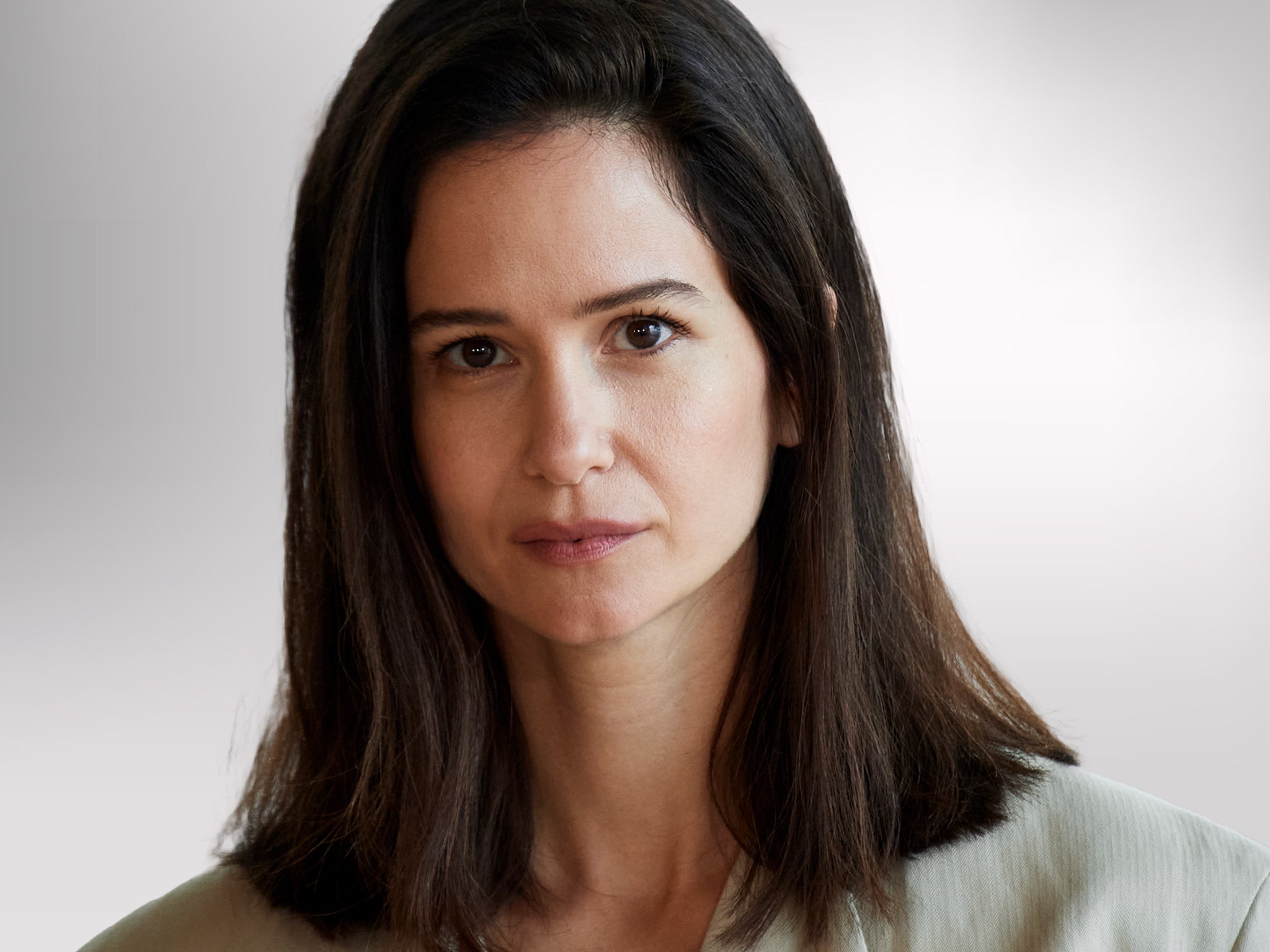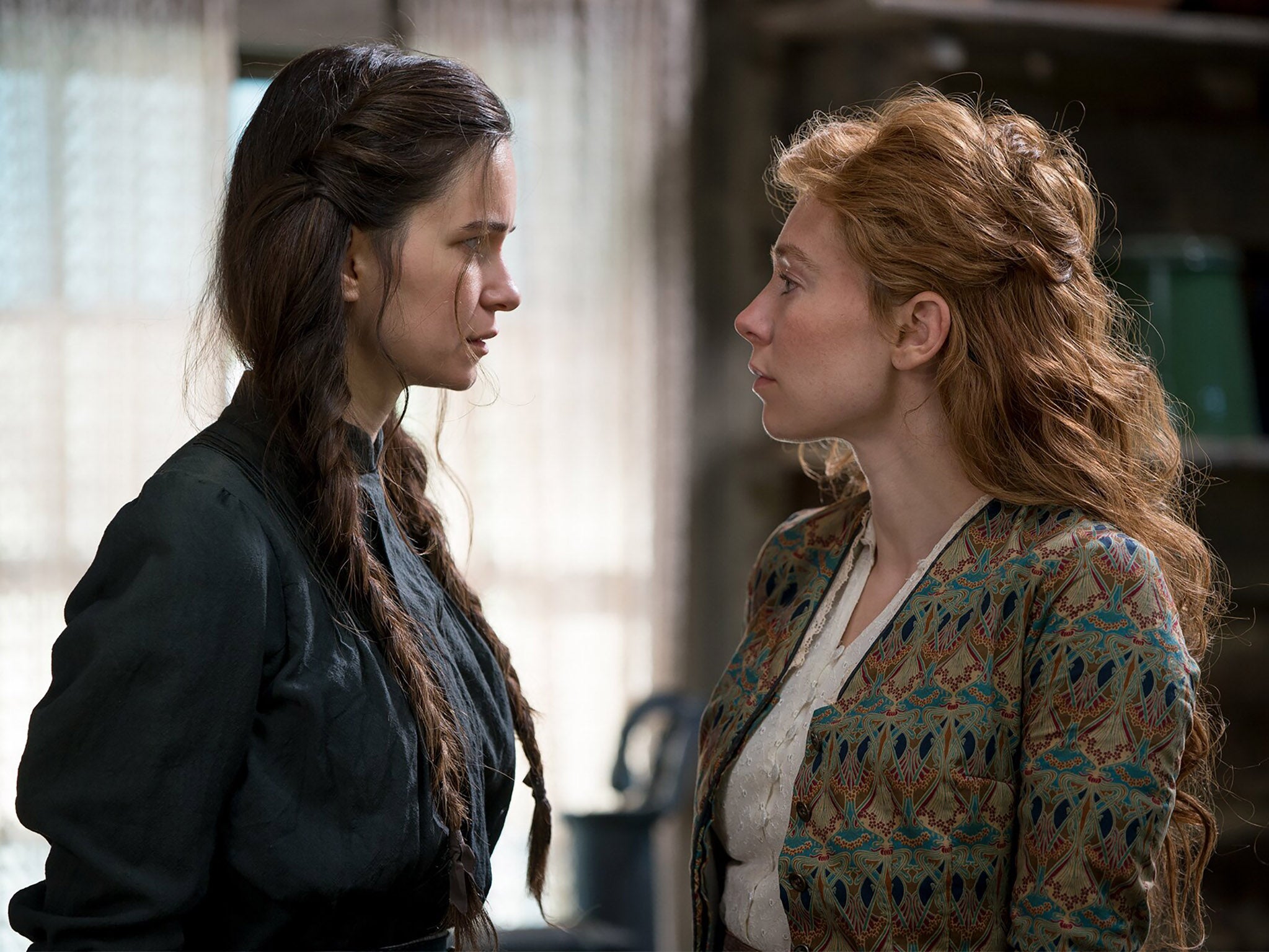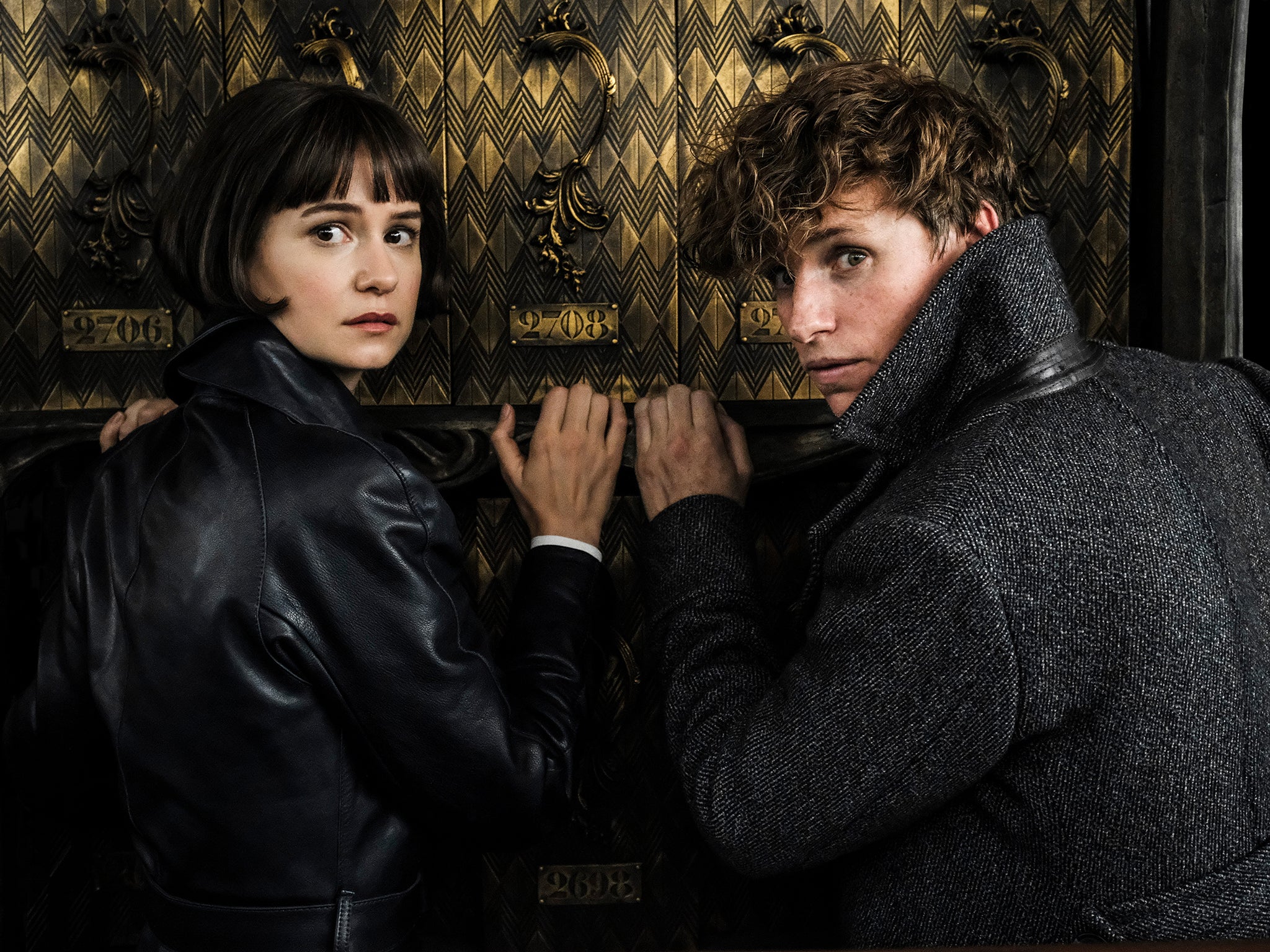Katherine Waterston: ‘It’s still pretty much a nightmare to be a woman’
The ‘Fantastic Beasts’ star took a while to become one of Hollywood’s most in-demand actors. She speaks to Alexandra Pollard about early setbacks, her nerves filming period romance ‘The World to Come’, and why she didn’t want to be ‘grouped in by association’ with JK Rowling’s views on trans women


Your support helps us to tell the story
From reproductive rights to climate change to Big Tech, The Independent is on the ground when the story is developing. Whether it's investigating the financials of Elon Musk's pro-Trump PAC or producing our latest documentary, 'The A Word', which shines a light on the American women fighting for reproductive rights, we know how important it is to parse out the facts from the messaging.
At such a critical moment in US history, we need reporters on the ground. Your donation allows us to keep sending journalists to speak to both sides of the story.
The Independent is trusted by Americans across the entire political spectrum. And unlike many other quality news outlets, we choose not to lock Americans out of our reporting and analysis with paywalls. We believe quality journalism should be available to everyone, paid for by those who can afford it.
Your support makes all the difference.Katherine Waterston is staring at the floor. She does this a lot – far more often than she meets my eye. She speaks slowly, fastidiously, often letting 15 seconds pass between one word and the next, as if she’s picking her way through the woods to avoid tripping on any roots. Interviews, says the Fantastic Beasts star, are difficult. “I just get so shy. That’s my curse.”
The current topic she’s traversing? Her slow start in Hollywood. “I’m being careful with my answer,” says the 41-year-old, “because it’s so easy to rewrite the past... When I started out, I didn’t see that there was a place for me.”
Until Waterston was 34, her palpable talent was mostly confined to the New York theatre scene. While she was playing Anya in The Cherry Orchard on stage, she was getting unnamed bit parts – “Third year”, “Shopgirl” – on screen. Bigger roles eluded her. The playwright Adam Rapp, who worked with Waterston in the theatre and with whom she was in a relationship for a number of years, once theorised that her height – she is six-foot tall – put off unimaginative casting directors. “They’d have been taking a risk casting such an Amazonian beauty,” he said. Eventually, someone did. After Paul Thomas Anderson cast Waterston in his hazy neo-noir Inherent Vice (2015) – and she duly stole every scene as loose cannon Shasta Fay Hepworth – things changed. She starred in Queen of Earth, Mid90s, Steve Jobs, Alien: Covenant, and JK Rowling’s Harry Potter spin-off Fantastic Beasts, bringing a stoic grace to all of them. But it was a slog to get there.
“What was being made available to me in Hollywood when I was very young was equal parts demeaning and boring,” says Waterston now, still sitting side-on, beside a large open window whose view is entirely obscured by leaves. “I struggled to find the people who wanted what I had to offer. And I found loads of people who wanted something I couldn’t offer.”
What was that? “Oh God, so many things,” she says. “I couldn’t be a chess piece. I wanted to…” Five seconds pass. Then 10. She changes direction. “The simple answer would be to say: I felt I was very smart, and hard-working, and I wanted to really be challenged and get into the weeds with other creative people. And I felt that the business wanted me to stand there and look nice, and it would be great if my skirt was a little shorter. I could say that. And it’s probably mostly true.” Another 10 seconds. “But I think the harder question to ask is how much I decided that the world was saying that to me, and how much it really was. This is a very uncomfortable area of exploration.”
She shifts back a little, so she’s silhouetted by the light from the “millisecond of sun” we’re currently enjoying in London (raised in Connecticut, she’s been living in the UK for the past few years). Dressed in a navy-blue oversized shirt, Waterston has a sort of androgynous, ageless beauty about her; her friend, the actor Natasha Lyonne, once described her as “like a gorgeous woman and a hot teenage boy”. When she does turn to face me, it is with a smile. “It could have been that I was young, and I was scared to stand up for what I thought I deserved,” she says. “And there might’ve been some people [in audition rooms] who I was writing off as part of the problem, and part of the patriarchy, that actually would have been thrilled to see me bring my intelligence to those scenes. And I just was getting a read that these rooms didn’t want that, and was coming in guarded, and with an idea of what was possible. I don’t know. I’ll never know.”
Instead, she went back to the theatre. “The only way I could tell you now, without a shadow of a doubt, that the sick culture of the patriarchy was dominating those rooms, is if I had had the nerve, the guts, to lose it all and say, ‘If you don’t like me as I am, that’s your loss.’ And be willing to risk that I’d never work in that town again. I wasn’t. But I’m sure there were a few young women out there in Hollywood at the same time as me who felt, ‘Oh, I’m going to just give it a shot in this room. I bet not every person here wants to dismiss, disrespect and dominate me.’ And you know, they might’ve got their careers off the ground in Hollywood faster than I got mine off the ground.” Retreating to theatre, she says, was an act of self-preservation. “I didn’t feel that I yet had a thick enough skin to go up against the patriarchy in Hollywood.”

The patriarchy looms large in her new film, The World to Come. Set in 1860s Schoharie County, New York, the film is part of a recent deluge of sapphic period pieces – by which I mean there are basically two others: Portrait of a Lady On Fire and Ammonite – but it sings from its own, transcendently beautiful hymn sheet. Adapted from a short story by Jim Shepard and directed by Mona Fastvold, the film, which was shot on celluloid, feels like both artefact and living thing – a dusty book with confessional scribbles in the margins. Waterston plays Abigail, a farm labourer’s wife whose daughter’s death has rendered her already difficult life almost unliveable. When Vanessa Kirby’s Tallie moves in nearby, they have a profound and instant attraction to one another. “There is something going on between us that I cannot unravel,” says Abigail.
Waterston was nervous when they filmed the scene where she first laid eyes on Tallie. “I felt that the film wouldn’t work if we didn’t get it right. I thought we needed to pull off a deep and profound recognition of the other. You have these two women, whose lives had never begun, had never been their own, recognise something in one another. Suddenly there is an avenue available to them that the moment before had simply not existed. It was a moment, for them, potentially more earth-shattering than simply love at first sight. So I thought all of that needed to be in this millisecond scene.” No pressure.

Watch Apple TV+ free for 7 days
New subscribers only. £8.99/mo. after free trial. Plan auto-renews until cancelled

Watch Apple TV+ free for 7 days
New subscribers only. £8.99/mo. after free trial. Plan auto-renews until cancelled
Usually, says Waterston, “when I worry about whether or not something will be [noticeable] in a scene, it isn’t, and I watch the film through my fingers in a kind of hell.” By now, this level of self-doubt doesn’t surprise me. “But that one, I felt that maybe, we kind of got it. That was a bit of good fortune.”
It took more than good fortune. Waterston gives a magnificent performance, at once tentative and open. In one scene, where Tallie reads Abigail a love poem she wrote, her reaction is so beautifully unexpected that I had to rewind to watch it again. Of course, Waterston refuses to take credit. “It’s almost a pity how much actors can take credit for good writing,” she says. “I still feel confident it’s one of the best scripts I’ll ever see.”
The film takes pains to highlight how women’s stories are absent from history books, literature, even farm ledgers. “These sorts of women, these sorts of stories, will have existed for as long as there’ve been people roaming the Earth,” says Waterston. “I’ve found accounts of medieval nuns’ love letters. There’s so little to study, but it is there.” It’s something she and Kirby would talk about. “We felt a tremendous sense of responsibility to honour these women that had gone unnoticed and ignored for so long. But also, we were both just so struck, in contrast, by the lives we get to lead, and all the many gifts we take for granted today. We are standing on the shoulders of women who have been doggedly optimistic, despite the difficulties of their day.”
Usually young women get mistreated because there’s a feeling that they don’t have a voice – perhaps there’s been a fear that, you know, I’m not just some fresh face from Wichita
I mention that Noemie Merlant, star of Portrait of a Lady On Fire, found it to be a revelation working on that film. “I realised how I was connected to the male gaze – like I was thinking and acting [according] to this frame of patriarchy,” she said. But outside of audition rooms, Waterston says: “I haven’t been conscious of the male gaze. It’s so hard to know, though. I suppose I felt the patriarchy far more with my pay cheques than with any director I’ve ever worked with. The disparity between what the boys and the girls get is where I feel it most. But I’ve been lucky. I’m just running through everything.” She sits in silence again, as she scrolls through a mental image of her filmography. Satisfied, she concludes, “I would say I’ve been lucky to have exclusively felt safe professionally. I know it’s not the common experience.”
And it’s not something that she should feel lucky to have avoided, I say. “Sometimes I wonder if it’s about being a second-generation actor,” she says. It is a mark of Waterston’s success that she isn’t known as “Sam Waterston’s daughter”, despite her father being an Oscar-nominated, Tony-winning actor who came up alongside Meryl Streep and John Cazale. She wouldn’t have been caught dead using his name to get a leg up during those years as a struggling theatre actor – she is allergic to self-promotion of any kind – but enough people knew who her father was that she suspects it protected her. “Usually young women get mistreated because there’s a feeling that they don’t have a voice, and it probably won’t go to the top. Perhaps there’s been a fear that, you know, I’m not just some fresh face from Wichita.” Then again, she adds: “It’s still pretty much a nightmare to be a woman.”
Even more so a trans woman. In August of last year, JK Rowling pointedly returned her Robert F Kennedy Human Rights Ripple of Hope Award, after the foundation’s president denounced the Harry Potter and Fantastic Beasts author’s anti-trans views. Rowling had published a blog in which she listed “five reasons for being worried about the new trans activism”, declaring her concern that “when you throw open the doors of bathrooms and changing rooms to any man who believes or feels he’s a woman… then you open the door to any and all men who wish to come inside”. The day after Rowling returned the award, Waterston, who has starred as the witch Tina Goldstein in two Fantastic Beasts films and is currently filming a third, shared a Guardian article to her Instagram story, headlined: “Trans women pose no threat to cis women, but we pose a threat to them if we make them outcasts.” She had circled and underlined – in red – various passages, including: “Sorry, you can’t be a feminist if you’re not for everyone’s human rights, notably other women’s human rights.”

When I mention that now, Waterston smiles. “I think because I was associated with a film project…” She decides to be more specific. “Because I was associated with Fantastic Beasts, it felt important to communicate my position. One wondered if they might be grouped in with other people’s views by association.”
That’s the upside of social media, I suggest. It can be a tool to immediately and directly communicate your own standpoint. “I have a very complicated relationship with social media as I’m sure most people do,” she says. She begins a typically ponderous treatise on social media, and then stops and asks that I not include it. “I’m trying to find something to say about social media and I don’t really have anything interesting to say,” she shrugs. Fair enough.
On that note, I’m told to wrap up. “Oh God, what a finale!” Waterston lets out a full-throttle laugh that takes me by surprise. “Cut the end!” It’s been lovely talking to her, I say. She shakes her head. “I was so incredibly awkward.” I don’t think there’d be any convincing her otherwise.
‘The World to Come’ is in cinemas now



Join our commenting forum
Join thought-provoking conversations, follow other Independent readers and see their replies
Comments